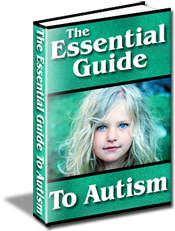Understanding Autism And Irrational Fears - 5 Ideas You Can Try Today
Click Here To Know The Simple Methods To Effectively Spot The 31 Signs of Autism
Part of supporting an autistic means understanding autism and helping autistics cope with their fears. An autistic may fear many things including sudden loud sounds, physical contact, the dark, strange smells, etc. In fact, many autistics fear things they have no control over. However, not every autistic person has the same fears. Therefore, you need to learn what upsets your child and find ways to help them cope.
The following are 5 common fears suffered by autistics, and how you can effectively handle the situation to create a more positive experience for your child.
1. Fear of the dentist ? Many autistic children are afraid of the dentist. This shouldn?t be too surprising, considering the dentist can be hard to take for the average person.
Understanding autism and fear of the dentist is a matter of introducing your child to the right dentist. You need to find a dentist who is experienced with children with disabilities, particularly autism. If you have trouble finding a dentist with such experience, your best option is to choose one who has compassion and a willingness to learn.
Overcoming the dentist fear is about slowly introducing your child to the environment. The first few visits should only consist of getting your child to sit in the chair and the dentist looking in his/her mouth. Furthermore, distractions such as TV can help make the process easier to take. This process can take several months.
2. Fear of the dark ? Many autistic children fear the dark because they can?t control it and fear the unknown.
To help your child overcome this fear, try a game of peek-a-boo with the blanket, allowing your child to move from dark to light at their control. Other methods that may work in understanding autism fears of the dark include providing your child with a flashlight, lamp or nightlight.
3. Fear of loud sudden noises ? Loud sudden noises such as a fire alarm or thunder, often startles and upsets autistics. Sensitivity to sound may be desensitized through sound recording. Provide your child with a recording of the sound that upsets him/her and allow them to start the sound and slowly increase its volume. Having control over the playback of sound can help the child become familiar with the noise, allowing them to recognize it when it occurs.
4. Fear of looking at people ? Many autistics don?t look directly at others. Many researchers believe this is because autistics cannot accurately interpret expressions and emotions. Thus, autistics generally find it disturbing to look at people?s faces.
New studies on understanding autism have found that autistics respond well to cartoons that feature trains and cars that have people?s faces superimposed on them. These particular cartoons known as ?The Transporters? have been particularly successful at helping autistics learn about emotions.
5. Fear of socializing ? One of the biggest autistic fears is socializing. This means that it is often difficult for them to make friends. The following are ways you can help encourage them to socialize with those their own age:
- Encourage your child to get phone numbers of some of his/her schoolmates and bring them home so you can make calls.
- Schedule a playtime or invite another family of a fellow schoolmate over to your home for brief interaction (2 hour limit)
- Don?t rely on the friendship of only one child. Invite more than one child over.
- Ask your child what he/she wants to do when the friend comes over. Create a list of activities so things remain entertaining. Just remember, you need to teach your child to be flexible and accept suggestions from others. This can take time.
The more knowledge people have in understanding autism, the easier it will be for your child to make and keep friends.
By Rachel Evans. Sign up for a free newsletter & discover how understanding autism & autism symptoms can give your child a big advantage.
Labels: autism_awareness, autism_definition, autism_education, autism_social_story, autism_support, autism_video

